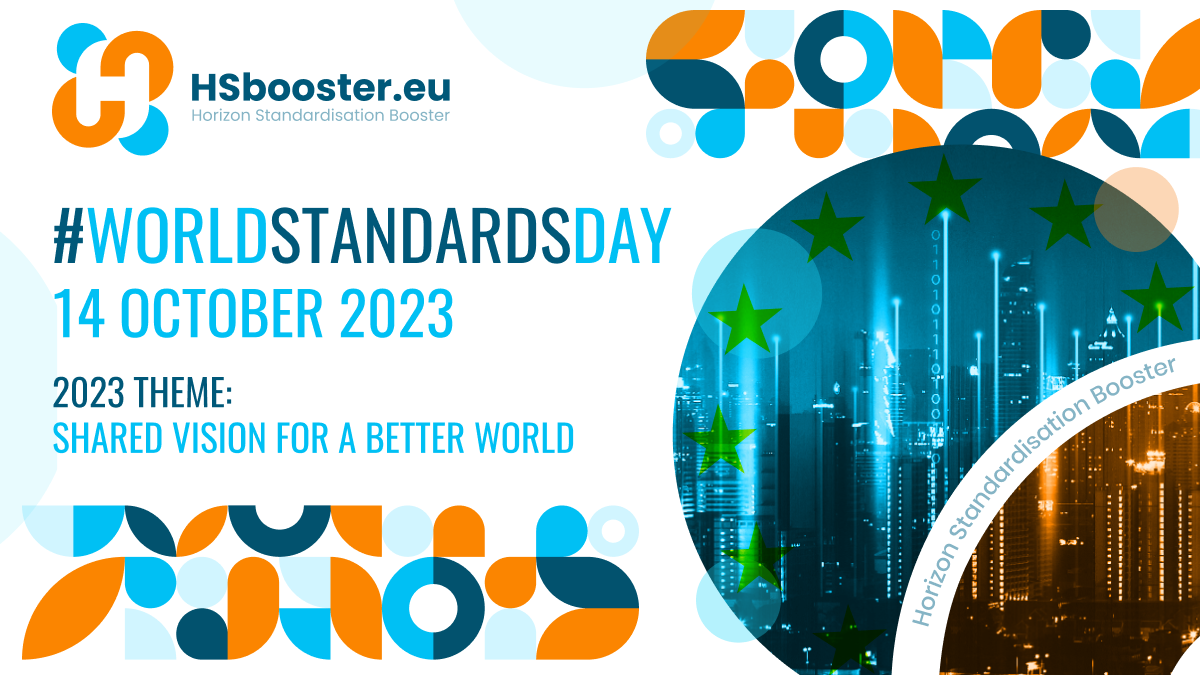Each year on 14 October, the standardisation community and members of IEC, ISO and ITU celebrate World Standards Day, a day dedicated to recognising the critical role that standards play in shaping our modern world. Recent celebrations hold particular significance within the European Union, as they align with the EU's standardisation policy and the Recommendations on Code of Practice for Standardisation.
HSbooster.eu in the EU standardisation landscape
With a focus on promoting innovation, the EU's standardisation policy underscores standards as more than mere guidelines, as they support market-based competition, help ensure the interoperability of complementary products and services, reduce costs, improve safety and enhance the competitiveness of European industry.
The Recommendations on Code of Practice for Standardisation help with the successful integration of R&I activities with standardisation. It identifies good practices and addresses R&I activities regardless of the technology area. It targets R&I actors within a wide range of technology readiness levels from terminologies and concepts, through testing to interoperability and performance.
With 320+ supported research projects and 160+ experts recruited, HSbooster.eu is an important player within the EU standardisation landscape, as its activities directly contribute to the goals of the Recommendations on Code of Practice for Standardisation and with the World Standards Day mission to increase the understanding of the importance of standardisation.
Advancing ICT Standardisation in Europe: Key Initiatives
In the European Union, there are various initiatives aimed at promoting and advancing ICT standardisation. These projects, implemented across diverse sectors, represent a concerted effort to enhance interoperability, innovation, and competitiveness within the digital realm. Leveraging the collective expertise of industry stakeholders, policymakers, and research institutions, these projects foster a collaborative environment for the development of robust and universally accepted ICT standards.
- BlockStand: BlockStand supports the increased participation of European experts in Blockchain and Distributed Ledger Technologies (DLT) standardisation activities to create an online blockchain community comprised of all stakeholders, that shall engage in continuous collaboration and exchange of ideas to bolster the European Union’s leadership in the field.
- OntoCommons: OntoCommons aims to lay the foundation for interoperable, harmonised and standardised materials and manufacturing data documentation through ontologies, facilitating data sharing and pushing data-driven innovation, to bring out a truly Digital Single Market and new business models for European industry, exploit the opportunities of digitalisation and address sustainability challenges.
- SEEBLOCKS.eu: SEEBLOCKS.eu is a project that aims at delivering a targeted, democratic, industry-driven initiative to support European interests in standardisation within the Blockchain and Distributed Ledger Technologies (DLT) domains, bringing together EU researchers and open standards specialists, along with industry and policy experts.
- STAND4EU: STAND4EU is a project that aims to boost the exploitation of standardisation Inputs from European Projects to to bridge the gap between research and market and increase the probabilities of market uptake of technological innovations.
- StandICT.eu 2026: StandICT.eu 2026’s principal goal is to strengthen its global reach in the European ICT Standardisation Ecosystem by launching and managing a fellowship programme, the EUOS (EU Observatory for ICT Standardisation) and Technical Working Groups (TWGs) to empower and enable contributions from EU ICT standardisation experts to tap directly into the WGs & TCs of SDOs, tackling EU priorities, challenges and gaps.
HSbooster.eu: Valorising EU research project results through standardisation
HSbooster.eu offers a consultancy service to ongoing and completed H2020, Horizon Europe and Digital Europe projects seeking guidance on standardisation-related aspects of their research projects. Adopting or contributing to standards is often an exploitation objective of R&I projects. This ensures the uptake and wider use of new technologies and inventions, guaranteeing interoperability and providing quality and higher safety levels of new technologies and products. Navigating the path to engage with standardisation working groups and technical committees, however, can be complex and costly for project consortia. This is why HSbooster.eu aims to assist projects in effectively navigating the standardisation landscape, ensuring their work aligns with relevant standards and maximising their impact in the market.
If you seek support for your project’s standardisation activities, the first step is to submit an application.


